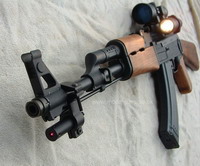United States is in hurry to deliver weapons to Iraq
Defense Secretary Robert Gates called for the delivery of weapons to Iraq more quickly, because the Iraqis have ordered US$100 million (70 million EUR) in military equipment from China.

He agreed that there are concerns that it is harder for the U.S. military in Iraq to track weapons purchased from countries other than America. In many cases, the Iraqis cannot account for weapons, which often end up in the hands of insurgents.
Speaking to reporters, Gates said the issue also came up at his meeting with Chilean Defense Minister Jose Mario Goni just prior to a news conference.
"This is an issue that we have to look into and see what we can do in the United States to be more responsive and be able to react more quickly to the requests of our friends," Gates said. "Unfortunately the (foreign military sales) program was set up in a way that was not intended to provide sort of emergency or short term supplies, as in the case of Iraq and we're trying to figure out how to do that better."
The Washington Post reported Thursday that Iraqi President Jalal Talabani said in an interview that Iraq ordered the Chinese military equipment for its police force in part because the U.S. is not delivering the arms fast enough.
Gates said he is not particularly worried that the Iraqis turned to China to get the equipment, but is more generally concerned about the slow pace of the U.S. process.
He noted that the United States has already delivered about US$600 million (425 million EUR) worth of equipment to the Iraqis, and has another US$2 billion to US$3 billion (1.4 billion EUR to 2.1 billion EUR) on order.
The Defense Department and the agency that handles foreign military sales - the Defense Security Cooperation Agency - have been working for more than a year to try to speed up the process, said Maj. Gen. Richard J. Sherlock Jr., director of operational planning for the Joint Chiefs of Staff.
It used to take a year, but now averages about five months from the time they get a precise list of what the Iraqis want to the time it is fielded, he told a Pentagon press conference.
"It depends on what equipment is being requested, it depends on whether it's in production, whether it needs to be placed in production, whether there's another claimant for those pieces of equipment that are in production, or whether that equipment's on the shelf," Sherlock said.
Gates said the U.S. has opened offices in Baghdad for the military sales, so that officials can have day-to-day dialogues with the Iraqis and "get their requirements more quickly and get them processed more quickly."
"This is a concern for us and is something we have to devote some attention to," said Gates, who was in Chile as part of a five-day, five-country swing through South and Central America.
The Pentagon sent a team of investigators to Iraq in August because of the growing number of cases of fraud and other irregularities in contracts involving weapons and supplies for Iraqi forces.
And the Government Accountability Office said earlier this year that the Pentagon cannot fully account for US$19.2 billion (13.6 billion EUR) worth of equipment provided to Iraqi security forces.
The GAO, the investigative arm of Congress, said it had reviewed records of the U.S. unit running the program to train and equip Iraqi forces and couldn't account for what happened to least 190,000 weapons. U.S. officials acknowledged that some might have fallen into the hands of insurgents, but also blamed some of the problems on bad record keeping.
In other comments Thursday, Gates said he talked with Goni about ways to strengthen the U.S. military relationship with Chile. The two men met for about 45 minutes at the ministry of defense, and Gates is scheduled to meet later with Chilean President Michelle Bachelet.
The two defense chiefs talked about cooperating more on removing land mines, having more joint military exercises and working to improve regional security - including issues such as drug trafficking and gang warfare.
Goni said they also talked about Chile's role in peacekeeping missions, including its current operations in Haiti. The two men signed an agreement that allows members of the armed services of each nation to have access to the other country's medical care and training.
Gates has visited defense and government leaders in El Salvador and Colombia this week, and is scheduled for stops in Peru and Suriname. It is his first trip to the region as defense chief, but he has been in Chile twice before, including a 1990 visit with then-President George Bush.
Subscribe to Pravda.Ru Telegram channel, Facebook, RSS!


